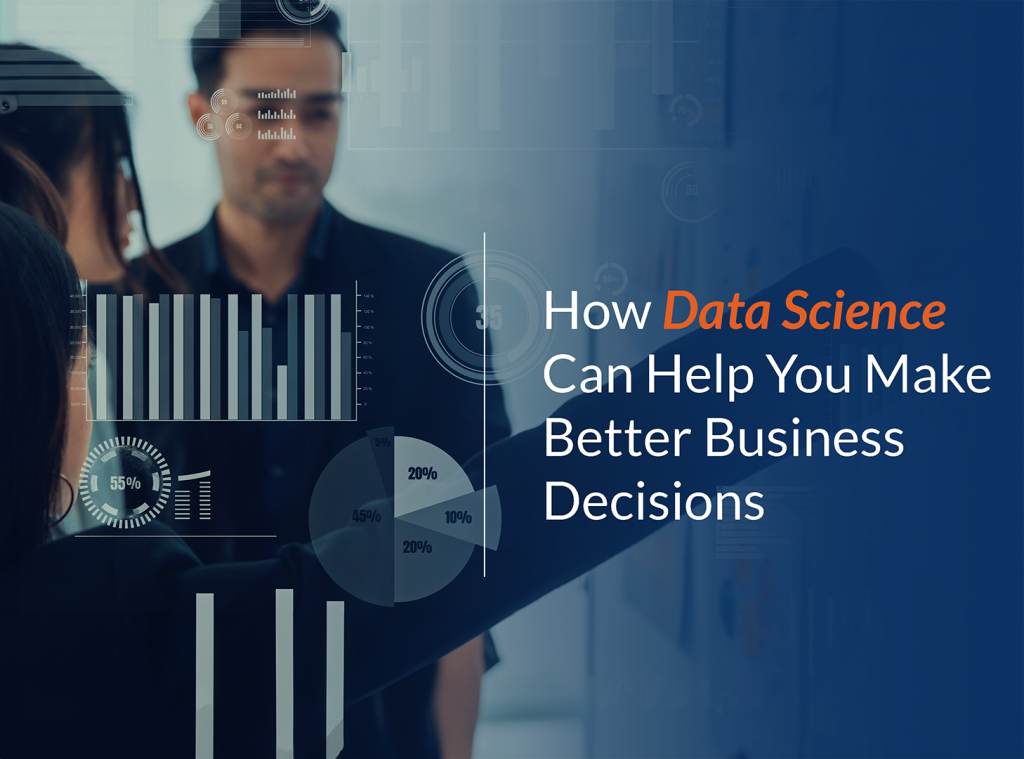In the digital age, data science stands as a pivotal force in business, transforming copious amounts of data into actionable insights for strategic advantage. It employs advanced analytics and machine learning to decode complex patterns, driving informed decisions, optimizing operations, and boosting competitiveness.
In this blog, we will delve into how Data Science can help businesses in making better decisions, seizing new opportunities, and mitigating risks. We’ll also explore how data science plays an important role in anchoring decisions in solid evidence, enabling businesses to navigate the market’s dynamism effectively. Embracing data-driven decision-making has become essential for thriving in today’s data-centric landscape!
The Power of Data Science
1. Unveiling Hidden Patterns and Trends
- Ever noticed how certain trends seem to emerge out of nowhere? With data science, you can uncover these subtle patterns across various industries. For instance, in retail, analyzing sales data might reveal seasonal buying habits that aren’t immediately obvious.
- By delving into your data, you can pinpoint both opportunities and risks. Whether it’s spotting a market gap or identifying potential pitfalls, data analysis equips you with insights to steer your business in the right direction.
2. Making Accurate Predictions
- Data science isn’t just about looking at the past; it’s about forecasting the future. Through sophisticated algorithms, you can anticipate upcoming trends or outcomes. This foresight empowers you to make proactive decisions rather than merely reacting to circumstances.
- Think of scenarios like predicting product demand or forecasting financial performance. With data-driven predictions, you’re better equipped to plan ahead and adapt to changing circumstances.
3. Understanding Your Customers
- Your customers are at the heart of your business. With data science, you can dive deep into customer behavior, preferences, and demographics. Understanding these nuances enables you to tailor your products or services to meet their needs effectively.
- Personalized marketing and enhanced customer experiences become more than just buzzwords. They become achievable goals, backed by concrete insights derived from customer data.
4. Optimizing Operations and Processes
- Every business thrives on efficiency. By analyzing operational data, you can identify bottlenecks, inefficiencies, and areas for improvement. This data-driven approach allows you to streamline processes, reduce costs, and ultimately increase productivity.
- Whether it’s optimizing supply chain logistics or refining internal workflows, data science provides the tools to make your operations leaner and more effective.
5. Data-Driven Decision Making
- Say goodbye to gut feelings and guesswork. Data science empowers you to make decisions based on concrete evidence. Instead of relying on intuition, you can trust in the insights derived from thorough data analysis.
- By embracing data-driven decision-making, you create an objective basis for evaluating options and choosing the best course of action. This systematic approach leads to more informed and ultimately more successful outcomes.
Real-life examples of Data Science in Action:
1. Retail Sector:
Predicting customer demand and optimizing pricing:
- Walmart: Uses historical sales data and weather patterns to predict demand for specific products in each store, optimizing inventory levels and preventing stockouts. This reduces costs and ensures customers find what they need.
- Amazon: Analyzes browsing history and purchase patterns to predict what individual customers are likely to buy, offering personalized recommendations and dynamic pricing that adjusts based on demand and willingness to pay.
Personalizing promotions for increased engagement:
- Target: Leverages customer purchase data to send targeted marketing campaigns and coupons, leading to higher engagement and conversion rates. Their infamous pregnancy prediction algorithm even sparked controversy!
- Starbucks: Uses its mobile app to send personalized promotional offers based on individual preferences and past purchases, encouraging repeat business and boosting customer loyalty.
2. Finance Sector:
Detecting fraudulent transactions and assessing creditworthiness:
- PayPal: Employs machine learning algorithms to analyze transaction patterns and identify suspicious activity in real-time, preventing fraudulent transactions and protecting user accounts.
- Credit card companies: Utilize complex scoring models that analyze financial data (income, debt, spending habits) to assess creditworthiness and determine loan eligibility, lowering risk for lenders and ensuring responsible lending practices.
Predicting market trends for investment strategies:
- Hedge funds: Employ quantitative analysts who build complex models that analyze market data (stock prices, economic indicators, news sentiment) to predict future trends and make informed investment decisions.
- Mutual funds: Utilize data-driven insights to diversify portfolios and manage risk effectively, offering investors more informed and potentially higher-performing investment options.
3. Healthcare Sector:
Improving diagnosis and predicting disease outbreaks:
- Hospitals: Analyze patient data (symptoms, medical history, genetic information) to diagnose diseases faster and more accurately, potentially saving lives and improving patient outcomes.
- Public health agencies: Utilize data from various sources (travel patterns, social media, weather data) to predict and track the spread of infectious diseases, enabling preventative measures and rapid response.
Developing personalized treatment plans based on patient data:
- Cancer treatment: Analyzing individual tumor profiles can lead to targeted therapies and personalized treatment plans with higher efficacy and fewer side effects.
- Mental health: Data from wearable devices and smartphone apps can be used to monitor patients’ mental health and tailor interventions to their specific needs.
These are just a few examples, and data science is constantly evolving with new applications emerging across various industries. The potential to leverage data for insights and improvements is vast, making data science a crucial driver of innovation and progress in today’s world.
Factors Influencing Data Science Effectiveness
1. Quality and relevance of data: The importance of clean and relevant data
Ensuring that your data is both clean and relevant is paramount to the success of any data science initiative. Clean data is free from errors, inconsistencies, and duplications, allowing for accurate analysis.
Meanwhile, relevant data aligns closely with the objectives of your analysis, providing meaningful insights that drive informed decision-making. Without high-quality data, the effectiveness of data science efforts can be severely compromised.
2. Expertise of data scientists: The role of skilled professionals in data analysis
The expertise of data scientists plays a crucial role in extracting valuable insights from data. Skilled professionals possess the knowledge and technical proficiency to navigate complex datasets, employ advanced analytical techniques, and interpret results accurately.
Their ability to apply statistical methods, machine learning algorithms, and data visualization tools enables them to uncover patterns, trends, and correlations that might otherwise remain hidden. Investing in talent with strong analytical skills is essential for maximizing the effectiveness of data science within your organization.
3. Organizational culture: Fostering openness to data-driven insights within the company
Organizational culture plays a significant role in determining the effectiveness of data science initiatives. A culture that values data-driven decision-making fosters an environment where insights derived from data are embraced and utilized across all levels of the organization.
This involves promoting transparency, encouraging collaboration between departments, and instilling a mindset of continuous learning and improvement. By fostering openness to data-driven insights, organizations can leverage the full potential of data science to drive innovation, efficiency, and growth.
Conclusion
In conclusion, the role of data science in the modern business landscape is not just transformative but pivotal for sustainable growth and competitive advantage. By leveraging the capabilities of advanced analytics, predictive modeling, and in-depth customer insights, businesses can navigate through the complexities of today’s market with greater precision and foresight.
The adoption of a data-driven mindset across all levels of an organization is fundamental in unlocking this potential. It ensures decisions are grounded in solid evidence, fostering a culture of innovation and efficiency. As businesses continue to invest in data literacy and collaborative practices between data experts and stakeholders, the promise of data science becomes increasingly tangible.
This strategic embrace of data science not only propels businesses towards their operational objectives but also sets the stage for enduring success in a rapidly evolving global market!




